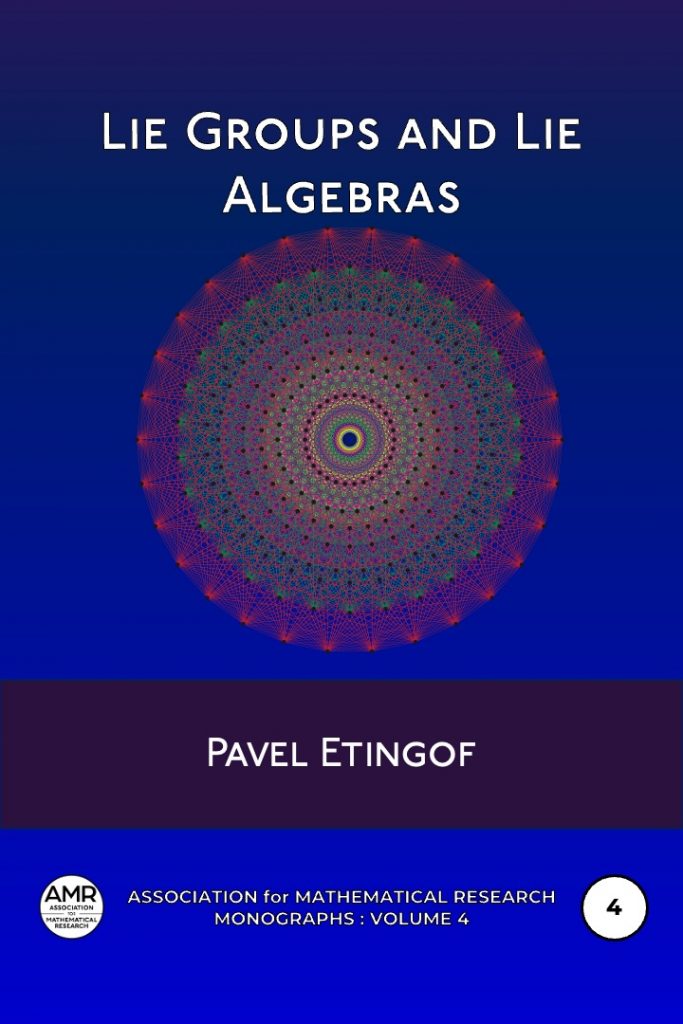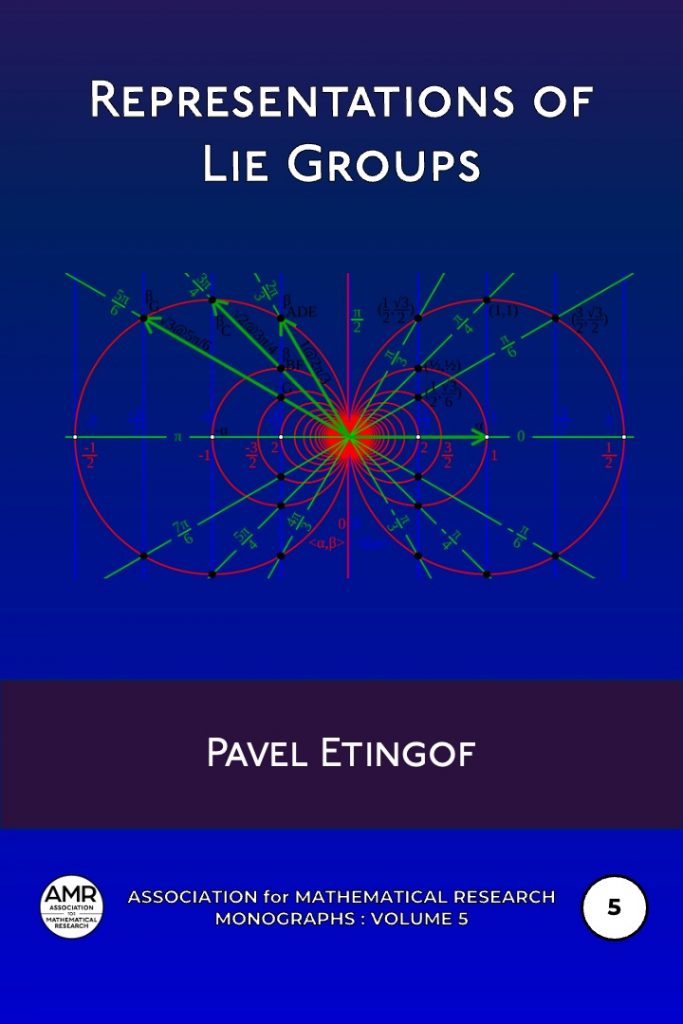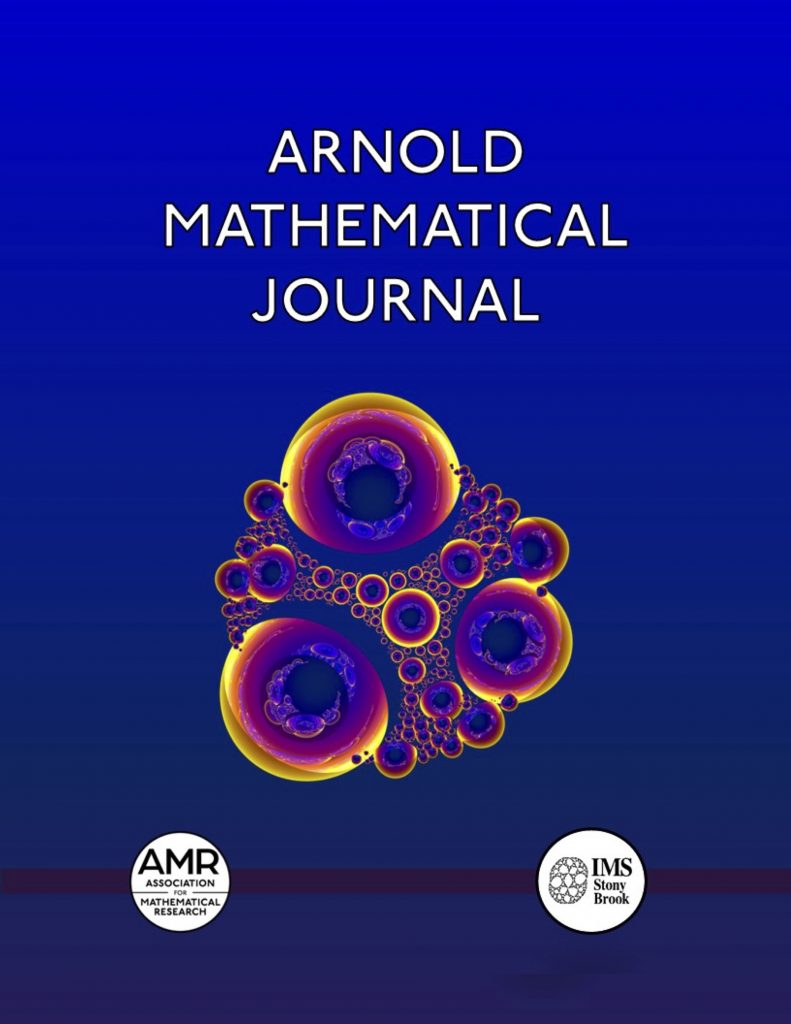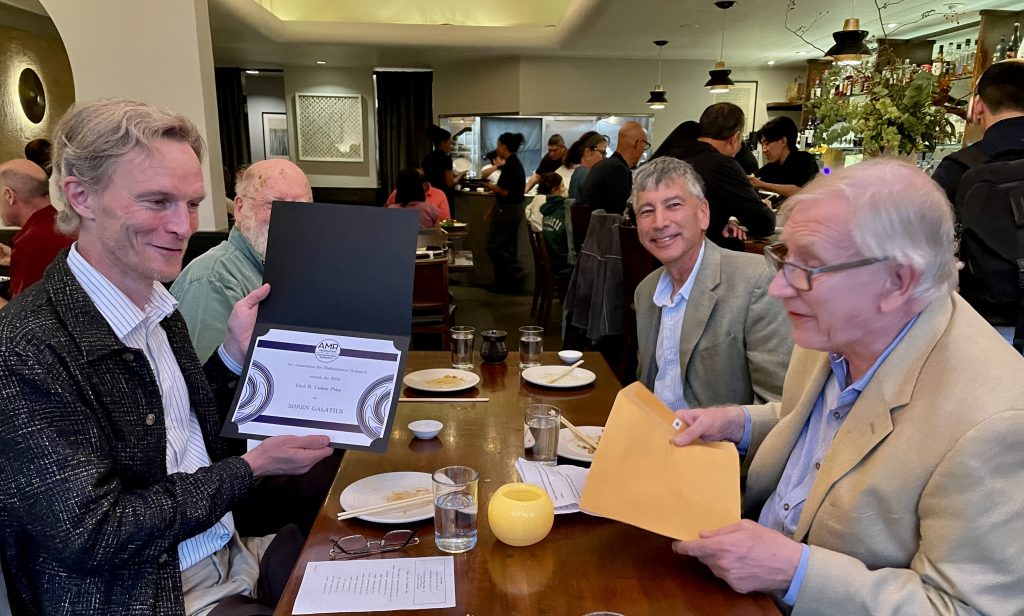AMR Newsletter
November 2024
The AMR has had a busy few months, getting three new journals underway, adding two books to our Research Monographs series, awarding the first Fred R. Cohen Prize, and hosting several online lectures. Read on to find out about recent highlights and for information on upcoming projects and events.
Using AI Language Models in Mathematics Research
Tune in for a zoom conversation between Robert Ghrist of U Penn (who is also U Penn’s Associate Dean of Undergraduate Education) and Alex Kontorovich of Rutgers/IAS, as they discuss and highlight practical techniques for the working mathematician looking to leverage AI language models to enhance their research program.
Monday Jan 27, 2025, 9 AM (Los Angeles), 12 noon (Montreal, New York), 5 PM (London), 6 PM (Madrid, Paris), 7 PM (Tel Aviv).
New Books from the AMR
Research Monographs Volumes 4 and 5
Lie Groups and Lie Algebras
PAVEL ETINGOF
|

Representations of Lie Groups
PAVEL ETINGOF
This book is based on a one-semester graduate course on representations of non-compact Lie groups given by the author at MIT (and contains a bit more material than fits into a course). It is organized into 31 sections, roughly corresponding to 1.5-hour lectures. The book first covers the basic analytic background (representations on Fr\’echet spaces, algebra of compactly supported measures on the group, smooth and analytic vectors, admissible representations, Harish-Chandra analyticity theorem, etc.), reducing the study of representations to Harish-Chandra modules. The rest is devoted to the algebraic study of Harish-Chandra modules, focusing on Harish-Chandra bimodules (corresponding to complex Lie groups regarded as real groups). This includes the category O, Chevalley restriction theorem, Chevalley-Shepard-Todd theorem, Harish-Chandra isomorphism, theorems of Kostant and Duflo-Joseph, projective functors, equivalence between Harish-Chandra bimodules and category O, classification of irreducible Harish-Chandra bimodules. At the end the book discusses a geometric approach to the subject using K-equivariant D-modules on the flag variety G/B, and derive the classification of irreducible Harish-Chandra modules (due to Langlands) in terms of K-orbits on G/B. Also given is a complete treatment of the representation theory of SL(2,R) and SL(2,C), including unitary representations. |

About the Author
Pavel Etingof is a Professor of Mathematics at MIT (since 2005) and the Chief Research Advisor of the MIT PRIMES Program (Program for Research in Mathematics, Engineering and Science for High School Students) since 2010. All AMR books can be downloaded at no cost; available at AMR books |
Mathematical Congress of the Americas
This month the AMR became a member society of the Mathematical Council of the Americas (MCofA), a network of professional mathematical societies and research institutes based in the Americas. The MCofA was founded in 2011. It is dedicated to promoting the development of mathematics throughout the continent. One of the main activities of the MCofA is the organization of the quadrennial Mathematical Congress of the Americas ( MCA ). The fourth MCA will take place in Miami in July 2025.
Journals


The Arnold Mathematical Journal, currently a Springer/Nature journal, will be published by the AMR starting with the first issue of 2025. The journal is owned by the Institute of Mathematical Sciences at Stony Brook University. It has been published since 2015. The journal will become diamond open access, with published articles available without charge to readers or authors.
The AMR publishes four journals on the diamond open access model:
- Journal of the Association for Mathematical Research,
- Journal of Experimental Mathematics,
- Journal of Open Mathematical Problems, and the
- Arnold Mathematical Journal.
The AMR journal page is here.
International Knot Theory Congress
The AMR is pleased to support the First International Knot Theory Congress, to be held on February 1-5, 2025. Co-sponsored by AMR, there will be over 100 talks on current research in knot theory. No registration is needed, and all talks will be available online.
Fred R. Cohen Prize
On October 19, 2024, the AMR hosted a dinner in Berkeley in honor of Søren Galatius, University of Copenhagen, winner of the first Fred R. Cohen Prize. Information about the prize and the citation is here.

(left to right: Søren Galatius, Rob Kirby, Joel Hass, Gunnar Carlsson) |
AMR-RMA Lecture
December 5, 2024
Alexander Razborov
University of Chicago and Steklov Institute
8 AM (Los Angeles), 11 AM (Montreal, New York), 4 PM (London), 5 PM (Madrid, Paris), 6 PM (Tel Aviv).
Title: Continuous Combinatorics
Abstract: Discretization, or replacing continuous objects with their finite approximations, is a common technique in mathematics. In this talk I will focus on several related efforts to go in the opposite direction, namely pretending that “very large” combinatorial objects are actually infinite and studying the resulting limit structures from different perspectives. Upon briefly reviewing the basics of the theory (graphons and flag algebras), I will report on some more recent developments. Those, time permitting, will include applications to the theory of quasi-randomness and to machine learning. This last part is based on joint work with L. Coregliano and on another paper by Coregliano and Malliaris.
Click here for details and to sign up for AMR_RMA Lecture Series announcements.
Vinberg Distinguished Lecture
December 13, 2024
Ivan Losev
Yale University
9 AM (Los Angeles), noon (Montreal, New York), 5 PM (London), 6 PM (Madrid, Paris), 7 PM (Tel Aviv)
Title: Quantizations and unitary representations
Abstract: The study of unitary representations of Lie groups is a classical subject in Representation theory going back to Gelfand and Harish-Chandra. The main, currently open, problem is to classify the irreducible unitary representations of semisimple Lie groups. Thanks to the work of Kirillov and Kostant the question of classifying the irreducibles fits into Geometric quantization that seeks to produce quantum mechanical systems from classical ones. In my talk I will explain some recent advances in Algebraic (a.k.a. Deformation) quantization of singular symplectic varieties and how they help to understand unipotent representations, an important class of unitary representations that are expected to serve as building blocks. This is based on my solo works as well as joint papers with Dmytro Matvieievskyi, Lucas Mason-Brown and Shilin Yu.
Click here for details and to sign up for AMR_RMA Lecture Series announcements
Primes is seeking faculty advisors
MIT PRIMES, a yearlong math research program for nationally selected, exceptionally talented high school students, is inviting new research projects from faculty and postdocs. Within a year, PRIMES students are expected to complete a research paper of publishable quality. Previous projects have resulted in over 400 papers, including nearly 200 posted on arXiv.org, and nearly 90 published in leading math journals, often in co-authorship with the mentor. PRIMES also includes Yulia’s Dream, a recently added program for talented students from Ukraine. For further information, see an overview article in the Notices of the AMS 62:8 (2015)). Faculty advisors suggesting projects, as well as potential mentors supervising research are welcome to contact PRIMES Program Director Slava Gerovitch at primes@math.mit.edu. The deadline is December 10.
AMR Projects looking for volunteers
Are you looking for a chance to make a meaningful impact? Do you have design skills? The AMR has a few exciting projects in the planning stage that need enthusiastic members to bring them to life! If you have skills in graphic design, web layout, or visual branding, your expertise is greatly needed and appreciated. Here are some examples:
Website Refresh: Help us improve the user experience and update the look of our site.
Event Materials: Design flyers, posters, and social media graphics for our upcoming events.
Branding: Assist in creating a cohesive look for our digital and printed materials.
If you have experience or interest in any of these areas, we’d love you to get involved. Working on these projects is a great way to connect with other members, develop new skills, and make a real difference within our organization.
How to Get Involved: Contact Alex Kontorovich: alex.kontorovich@rutgers.edu. Let us know your areas of interest, and we’ll try to match you with a project that fits your skills and availability. Thank you for considering this opportunity to contribute to the support of mathematical research.
Support the AMR
All AMR activities are run by volunteers. We have no paid staff, but we do have a variety of ongoing costs. Please consider donating to help expand our activities and build an organization focused on mathematical research and scholarship. You can donate at amathr.org/donate. The AMR is a is a 501(c)(3) non-profit organization and donations are tax deductible as allowable by law.
Editor: Abigail Thompson
AMR Board of Directors: |
Colin ADAMS, Williams College |
